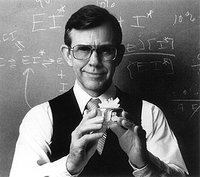Franz, John E.

| Topics: |
In recent years the ability of chemical scientists to create new molecules and transform existing ones has greatly contributed to preserving our environment. Since the 1960s chemists have engineered new pesticides that break down more rapidly instead of accumulating in soil and water. Two chemists, John E. Franz (1929– ) of Monsanto and Marinus Los (1933– ) of American Cyanamid, devised new herbicides—necessary for ensuring an abundant food supply for a growing world population—that do not harm the environment.
From the age of 10, Franz knew that he wanted to become a scientist. In thrall to chemistry, he had to be persuaded by a friendly high school teacher to study physics, mathematics, and other subjects in order to prepare properly for college. At the University of Illinois (B.S., 1951) he focused on chemistry, but not to the exclusion of other subjects. He went on to complete a Ph.D. in organic chemistry at the University of Minnesota, and then joined Monsanto. After a dozen years he was transferred to the company's agricultural unit, where he had to teach himself plant physiology and biochemistry. Franz, in his new position, began work on a project that other investigators had dropped—finding an herbicide effective against both perennial and annual weeds. The earlier investigators knew that two compounds were weakly active in this regard, but after nine years of trying various molecular analogs, they failed to produce a more effective herbicide. Franz tried a similar line of research for a year and finally hypothesized—falsely, as it turned out—that the weakly effective compounds were metabolized in the plant into herbicidal agents. On the basis of this hypothesis he screened possible metabolites and found glyphosate, a broadly effective herbicide with no toxic effect on mammals, birds, fish, insects, and most bacteria. Only later was the mechanism and selectivity of the product (sold as "Roundup") correctly explained; the glyphosate inhibited the formation of an enzyme found only in plants.
Further Reading